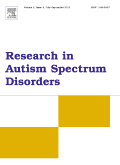
Research in Autism Spectrum Disorders
Scope & Guideline
Advancing understanding through innovative research.
Introduction
Aims and Scopes
- Multidisciplinary Research on ASD:
The journal encompasses a wide range of disciplines, including psychology, neuroscience, education, and public health, facilitating a comprehensive understanding of autism spectrum disorders. - Focus on Intervention and Treatment Outcomes:
A significant emphasis is placed on evaluating various interventions, therapies, and educational strategies aimed at improving outcomes for individuals with ASD and their families. - Exploration of Co-occurring Conditions:
Research examining the prevalence of co-occurring mental health conditions, behavioral issues, and developmental disorders in individuals with autism is a core focus, highlighting the complexity of ASD. - Community and Family Perspectives:
The journal prioritizes studies that incorporate the experiences, challenges, and needs of families and communities affected by autism, fostering a holistic view of ASD. - Biological and Genetic Research:
There is a consistent interest in exploring the biological and genetic underpinnings of autism, including studies on biomarkers, genetic variants, and neurodevelopmental factors. - Cultural and Societal Contexts:
Research addressing the cultural and societal influences on the understanding and management of autism in diverse populations is increasingly recognized as vital.
Trending and Emerging
- Neurodiversity and Identity:
An increasing focus on neurodiversity and the lived experiences of autistic individuals is evident, promoting acceptance and understanding of autism as a valid neurological variation rather than a disorder. - Impact of COVID-19:
Research examining the effects of the COVID-19 pandemic on individuals with autism and their families has surged, addressing mental health, social isolation, and service accessibility. - Technology and Telehealth Interventions:
The rise of telehealth and technology-based interventions, especially in response to the pandemic, reflects a growing trend towards innovative solutions for therapy and support. - Sensory Processing and Regulation:
There is a trend towards exploring sensory processing issues and their impact on behavior and daily functioning, emphasizing the importance of sensory integration in autism. - Community and Parental Involvement:
Emerging research highlights the critical role of community and family engagement in intervention strategies, recognizing the importance of support networks and collaborative approaches. - Mental Health and Well-being:
A growing body of work is focusing on the mental health challenges faced by individuals with autism, including anxiety, depression, and stress, emphasizing the need for integrated mental health support.
Declining or Waning
- Traditional Diagnostic Criteria:
Research centered solely on traditional diagnostic criteria for autism, such as DSM-IV classifications, has diminished as the field moves towards more nuanced understandings of the spectrum. - Generalized Interventions without Specific Focus:
There has been a decline in studies proposing generic interventions without tailored approaches or specific target populations, as the field shifts towards more individualized and evidence-based practices. - Overemphasis on Early Childhood Studies:
While early intervention remains crucial, there is a noticeable decrease in studies focusing exclusively on early childhood, with a growing emphasis on adolescent and adult experiences. - Single-faceted Approaches to ASD:
Research that predominantly investigates ASD from a singular perspective—be it purely behavioral, educational, or medical—is declining in favor of more integrative, multidisciplinary approaches. - Stigmatization and Stereotypical Narratives:
The exploration of stigma surrounding autism has shifted away from negative stereotypes towards more empowering narratives that highlight strengths and capabilities.
Similar Journals

Current Developmental Disorders Reports
Advancing insights into developmental disorders.Current Developmental Disorders Reports, published by SPRINGERNATURE, is a crucial resource for researchers, practitioners, and students in the fields of developmental psychology, psychiatry, and neuroscience. Since its inception in 2014, this journal has aimed to disseminate cutting-edge research on the multifaceted nature of developmental disorders, providing valuable insights into causation, diagnosis, and intervention strategies. With an E-ISSN of 2196-2987 and a notable standing in the Q3 quartile across multiple fields—developmental and educational psychology, developmental neuroscience, and psychiatry and mental health—this journal holds a significant position in the academic landscape. Researchers contributing to the journal benefit from its open access policies, stimulating knowledge sharing and dialogue within the scientific community. The journal’s commitment to advancing understanding in these critical areas of study is reflected in its rigorous publication standards and diverse range of articles, making it an essential read for anyone invested in the developments in mental health and developmental disorders.

Psicologia Clinica dello Sviluppo
Empowering scholars to tackle contemporary psychological challenges.Psicologia Clinica dello Sviluppo, published by SOC ED IL MULINO in Italy, is a noteworthy journal that focuses on the expansive fields of clinical and developmental psychology. Since its inception in 1998, the journal has been committed to disseminating high-quality research that bridges theoretical frameworks and practical applications within these domains. With its ISSN 1824-078X and E-ISSN 1824-078X, the journal provides a platform for scholars to explore critical issues in psychological development and clinical practice. Despite recent rankings placing it in the fourth quartile across both Clinical Psychology and Developmental and Educational Psychology categories, the journal is dedicated to fostering a growing body of knowledge that can influence policy and practice. Researchers, professionals, and students will find valuable insights in its contents, contributing to the advancement of psychology as a science and a profession. The journal accepts submissions and actively encourages contributions that tackle contemporary challenges in the field.
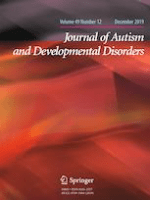
JOURNAL OF AUTISM AND DEVELOPMENTAL DISORDERS
Pioneering interdisciplinary dialogue in autism research.JOURNAL OF AUTISM AND DEVELOPMENTAL DISORDERS, published by Springer/Plenum Publishers, is a premier academic journal dedicated to advancing knowledge in the field of autism and related developmental disorders. With an impressive impact factor reflecting its reputation for rigorous peer-reviewed research, this journal has firmly established itself within the Q1 category of Developmental and Educational Psychology, ranked #32 out of 360 journals in its category, placing it in the top 91st percentile. The journal covers a broad range of topics, including intervention strategies, developmental trajectories, and the neurobiology behind autism spectrum disorders, making it an essential resource for researchers, educators, and clinicians alike. Since its inception in 1979, the journal has maintained a commitment to disseminating significant findings that can contribute to better understanding and support for individuals with developmental disorders, promoting interdisciplinary dialogue and collaboration. While it is not offered as open access, the Journal of Autism and Developmental Disorders remains a vital platform for the dissemination of transformative research in this crucial area.
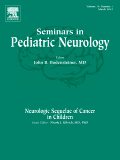
Seminars in Pediatric Neurology
Advancing knowledge in pediatric neurology.Seminars in Pediatric Neurology, published by W B SAUNDERS CO-ELSEVIER INC, is a prestigious journal dedicated to the evolving field of pediatric neurological disorders. Since its inception in 1994, this peer-reviewed journal has provided critical insights and cutting-edge research to support healthcare professionals in enhancing the quality of care for children with neurological conditions. With an impressive 2023 impact factor and a Q2 ranking in both the clinical neurology and pediatrics categories, it stands as a vital resource, fostering the dissemination of knowledge among researchers and clinicians alike. Featuring articles that explore a range of topics from clinical trials to innovative treatment modalities, this journal empowers practitioners with the latest findings in pediatric neurology. While primarily subscription-based, it plays a key role in bridging the gap between academia and clinical practice, making it an indispensable tool for anyone involved in the care and treatment of pediatric neurological patients.

Analysis of Verbal Behavior
Illuminating the pathways of language through empirical inquiry.Analysis of Verbal Behavior is a premier academic journal dedicated to advancing the understanding of verbal behavior and its applications within various disciplines, including psychology, linguistics, and education. Published by Springer, a prominent name in scholarly publishing, this journal serves as a vital resource for researchers, professionals, and students alike. With an ISSN of 0889-9401 and an E-ISSN of 2196-8926, it is accessible through traditional subscriptions, further enhancing its reach among the academic community. The journal is committed to disseminating high-quality research, including empirical studies, theoretical analyses, and practical applications, thereby contributing significantly to the field of behavior analysis. Scholars looking to stay current on the latest developments and methodologies in verbal behavior will find Analysis of Verbal Behavior essential for their professional and academic pursuits.
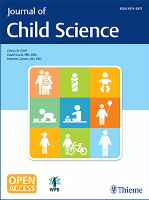
Journal of Child Science
Fostering evidence-based practices in child science.Journal of Child Science, published by GEORG THIEME VERLAG KG, is a pioneering academic journal dedicated to advancing knowledge in the fields of pediatrics, perinatology, and child health, with a special focus on surgical interventions involving children. Since its inception in 2017, this journal has endeavored to provide a platform for high-quality, peer-reviewed research that addresses critical topics related to child development and health care. With an ISSN of 2474-5871, it occupies a Q4 quartile ranking in both Pediatrics and Surgery as of 2023, demonstrating its growing presence in the academic community. Although currently non-open access, the journal aims to become a vital resource for healthcare professionals, researchers, and students interested in improving child health outcomes through informed and evidence-based practices. With a commitment to upholding rigor and integrity in research, Journal of Child Science stands as an essential avenue for discourse and discovery in child science and medicine.
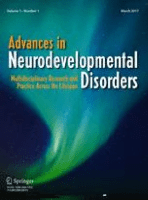
Advances in Neurodevelopmental Disorders
Empowering Knowledge in Neurodevelopmental DisordersAdvances in Neurodevelopmental Disorders is a leading peer-reviewed journal published by SpringerNature, focusing on the critical intersection of psychology and social sciences as they pertain to neurodevelopmental disorders. With its ISSN 2366-7532 and E-ISSN 2366-7540, this journal has carved out a significant niche since its inception in 2017, particularly recognized for its influence in academia, evident from its category quartiles in 2023, which rank it Q3 in Psychology and Q2 in Social Sciences. The journal is committed to disseminating innovative research and knowledge that advance our understanding of neurodevelopmental disorders, making it an essential resource for researchers, professionals, and students dedicated to this field. With increasing citations and a respectable Scopus ranking—#209 in Social Sciences and #46 in Psychology—the journal continues to foster interdisciplinary dialogue and scientific advancement. Based in the Netherlands and published out of London, it offers a platform for open access to significant findings and discussions related to neurodevelopmental challenges, addressing a vital area of health that impacts individuals and families worldwide.

JOURNAL OF DEVELOPMENTAL AND BEHAVIORAL PEDIATRICS
Advancing pediatric knowledge for healthier futures.JOURNAL OF DEVELOPMENTAL AND BEHAVIORAL PEDIATRICS, published by Lippincott Williams & Wilkins, stands as a pivotal platform for interdisciplinary research in the fields of pediatrics, psychology, and mental health. Established in 1980 and with a comprehensive coverage extending to 2024, this esteemed journal operates within the realms of developmental and educational psychology, medicine, and psychiatry, earning a commendable Q2 ranking in its respective categories as of 2023. Its overarching objective is to disseminate high-quality, peer-reviewed studies that address the intricate interplay between developmental milestones and behavioral health in children. Although it does not currently offer open access, the journal's influential presence in the scholarly community is underscored by its strategic positioning within the Scopus rankings, making it an invaluable resource for researchers, practitioners, and students committed to advancing the health and well-being of children and adolescents.

PSYCHOANALYTIC PSYCHOLOGY
Connecting Theory and Practice in Clinical PsychologyPSYCHOANALYTIC PSYCHOLOGY is a distinguished journal published by the Educational Publishing Foundation of the American Psychological Association, specifically tailored to the field of Clinical Psychology. With an ISSN of 0736-9735 and an E-ISSN of 1939-1331, this journal has been a pivotal platform for scholarly discourse since its inception in 1984 and will continue to serve the academic community through 2024. While the journal currently operates under traditional access options, it maintains a reputable presence in the field, reflected by its ranking in the Q3 category for Clinical Psychology as of 2023, and a Scopus percentile that places it in the 41st percentile among its peers. Aimed at researchers, professionals, and students alike, PSYCHOANALYTIC PSYCHOLOGY is committed to advancing psychoanalytic practice and education through the dissemination of rigorous research findings, theoretical discussions, and innovative clinical practices, solidifying its importance in the continuous evolution of psychological science.
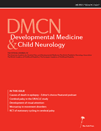
DEVELOPMENTAL MEDICINE AND CHILD NEUROLOGY
Fostering excellence in pediatric neuroscience research.DEVELOPMENTAL MEDICINE AND CHILD NEUROLOGY, published by WILEY, is a premier journal dedicated to advancing knowledge in the fields of developmental neuroscience, clinical neurology, and pediatrics. With an impressive impact factor, this journal is recognized for its contributions, achieving Q1 ranking in both Pediatrics, Perinatology and Child Health, and Neurology (Clinical) sectors, as well as Q2 in Developmental Neuroscience. Since its inception in 1958, the journal has been at the forefront of disseminating vital research that informs clinical practice and enhances child health outcomes. Researchers and practitioners benefit from its high-quality, peer-reviewed articles that address critical issues in child neurology, underpinned by a robust Scopus ranking and a formidable percentile standing in relevant categories. While currently not an open-access journal, it remains a key resource for those dedicated to the study of child development, particularly at its intersection with neurological health. With a commitment to excellence, DEVELOPMENTAL MEDICINE AND CHILD NEUROLOGY is an essential read for anyone engaged in the care and research of pediatric populations.